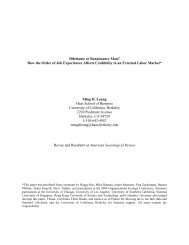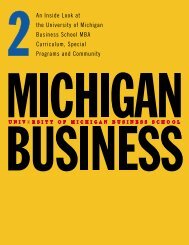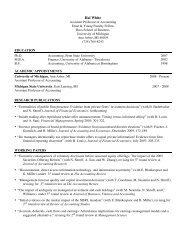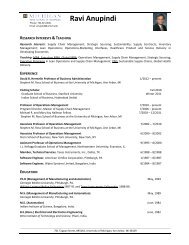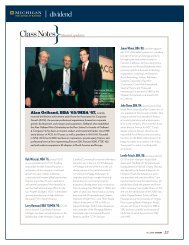DIvIDEnD - Stephen M. Ross School of Business - University of ...
DIvIDEnD - Stephen M. Ross School of Business - University of ...
DIvIDEnD - Stephen M. Ross School of Business - University of ...
Create successful ePaper yourself
Turn your PDF publications into a flip-book with our unique Google optimized e-Paper software.
Entrepalooza 2009: Strategies for Aspiring Startups<br />
ravi Mohan,<br />
MBA ’96<br />
Despite the gloomy economic<br />
news, it’s still a good time to start<br />
a company, according to veteran<br />
venture capitalist Ravi Mohan,<br />
MBA ’96. “entrepreneurship and<br />
innovation can be brought to any<br />
product category as long as you have<br />
unique customer insight and you<br />
execute relentlessly against it.”<br />
mohan, co-founder and managing<br />
director at silicon valley-based shasta ventures, presented a<br />
keynote address in september at the <strong>Ross</strong> school’s annual<br />
entrepalooza symposium. sponsors included the school’s<br />
samuel Zell and Robert h. lurie institute for entrepreneurial<br />
studies, the center for venture capital and Private equity<br />
finance, and the student-led entrepreneur and venture club.<br />
mohan cited the personal financial management service mint,<br />
the online shoe retailer Zappos, and the cleaning products company<br />
method as three young ventures that entered incredibly<br />
competitive spaces and still delivered huge returns.<br />
“you don’t need technology to create a competitive advantage,”<br />
mohan insisted. “competitive advantage can be created through<br />
Private Equity Expert: “Turbulence creates opportunity”<br />
Private equity funds have an opportunity to cash in on some good buys in the next five to seven<br />
years, and they should start planning now. That’s the reading from Michael levitt, BBA ’80/JD ’82,<br />
founder and chairman <strong>of</strong> New York-based Stone Tower Capital LLC, one <strong>of</strong> the largest investment<br />
firms in the credit market with about $40 billion in assets.<br />
Levitt delivered the keynote address at the Michigan Private Equity Conference, hosted in<br />
September by the Zell Lurie Institute for Entrepreneurial Studies and its Center for Venture<br />
Capital and Private Equity Finance.<br />
He notes that prior to 2008, when credit markets were frothy and banks eager to issue loans,<br />
they did so without setting strict covenants, such as EBITDA requirements. From 2012 to 2014<br />
many <strong>of</strong> those covenant-light loans will be coming due, and they’re not candidates for refinancing.<br />
“A lot <strong>of</strong> it is going to default,” Levitt says, which will create value opportunities for private equity<br />
buyers. The problem is that the investor commitment period for many private equity funds expires<br />
just before those defaults will occur. Private equity funds are going to have to work with their<br />
investors and convince them to stay on to take advantage <strong>of</strong> a huge opportunity, he notes.<br />
“That’s the conversation I’m having with state pension funds,” Levitt says. “The money expires in<br />
two to three years, and the good opportunities will be in two to five years. Most investment funds,<br />
when they get close to the expiration period, will draw the capital. That might not be the right<br />
decision. The right decision would be to extend that period.<br />
“Turbulence creates opportunity, and the coming wave <strong>of</strong> maturities creates opportunity,” he<br />
continues. “I really believe the next five to seven years are going to be the best time to invest in<br />
these sorts <strong>of</strong> markets that I’ve ever seen.” —Terry Kosdrosky<br />
superior customer insight and by creating products and services<br />
that meet those needs.”<br />
<strong>of</strong> course, financing is critical to any startup. But fewer than<br />
one percent <strong>of</strong> all small businesses are suitable for venture-capital<br />
funding, said Ned Hill, managing director <strong>of</strong> DfJ mercury. entrepreneurs<br />
should research federal contracts and grants, as well as<br />
other creative options. “Don’t just think ‘vc or bust,’” he said.<br />
approaching a venture-capital firm for seed or early-stage<br />
investment money “is not about a transaction. it’s a relationship<br />
you are building,” advised Armando Pauker, MBA ’95, general<br />
partner at apex venture Partners. “we see many people who<br />
are very technology-driven, but you also have to think about the<br />
market, the customers, and the business model. we’re investing<br />
in a business, not in a technology.”<br />
hill encouraged entrepreneurs to take heart, despite the grim<br />
economic news <strong>of</strong> late. “the markets are up, and we’re seeing<br />
more people coming up for air and putting capital to work,” he<br />
said. “we’ve seen a slight upturn in iPo activity and an uptick<br />
in m&a activity. more important, people are beginning to pay<br />
strategic premiums in some places.”<br />
“companies are starting to feel more bullish,” Pauker added.<br />
“and that’s good news.” —Claudia Capos<br />
STRICT FInanCE CLaWS<br />
During a recent visit to famed<br />
financier Warren Buffett at his<br />
Berkshire Hathaway headquarters,<br />
MBA/MS candidate adam<br />
Carver (left) tapped the Oracle <strong>of</strong><br />
Omaha’s inner Wolverine. Carver<br />
was one <strong>of</strong> several <strong>Ross</strong> students<br />
who participated in the trip,<br />
sponsored by the Entrepreneur<br />
and Venture Club.<br />
spring 2010 <strong>DIvIDEnD</strong> 11




